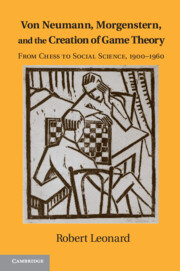Book contents
- Frontmatter
- Contents
- Acknowledgments
- Von Neumann, Morgenstern, and the Creation of Game Theory
- Introduction
- Part One Struggle and Equilibrium: from Lasker to von Neumann
- Part Two Oskar Morgenstern and Interwar Vienna
- Part Three From War to Cold War
- 9 Mathematics and the Social Order
- 10 Ars Combinatoria
- 11 Morgenstern's Catharsis
- 12 Von Neumann's War
- 13 Social Science and the “Present Danger”
- Conclusion
- Bibliography
- Index
- Plate section
10 - Ars Combinatoria
Creating the Theory of Games
Published online by Cambridge University Press: 05 December 2013
- Frontmatter
- Contents
- Acknowledgments
- Von Neumann, Morgenstern, and the Creation of Game Theory
- Introduction
- Part One Struggle and Equilibrium: from Lasker to von Neumann
- Part Two Oskar Morgenstern and Interwar Vienna
- Part Three From War to Cold War
- 9 Mathematics and the Social Order
- 10 Ars Combinatoria
- 11 Morgenstern's Catharsis
- 12 Von Neumann's War
- 13 Social Science and the “Present Danger”
- Conclusion
- Bibliography
- Index
- Plate section
Summary
Introduction
From the moment he began to consider leaving Vienna, Morgenstern had his eye on the Institute for Advanced Study. In 1935, in the belief that economic research would have social benefits, Institute director Flexner had added a School of Economics and Politics, bringing in economists Edward Mead Earle, David Mitrany, and Winfield Riefler. In a community that privileged research in pure mathematics and mathematical physics, this overture to social science, which many considered not even good applied mathematics, provoked outrage. Indeed, it ultimately led to Flexner's ouster and replacement in 1939 by Frank Aydelotte.
Morgenstern was probably unaware of these internal troubles when, in June 1937, in anticipation of his visit to the United States the following year as Carnegie Professor, he sent Flexner a copy of The Limits of Economics, and said that he looked forward to meeting him and Riefler. With Wagemann's arrival in Vienna occurring in the interim, Morgenstern never returned to Austria and he accepted a position in the nearby Princeton Economics Department.
Once there, he found himself in a situation not dissimilar to the one he had left behind: amongst economists, of whom he was critical, looking elsewhere for stimulus. By November 1938, unsatisfied with his lecturer’s salary at Princeton, he was viewing the Institute increasingly keenly – “the double income etc. and no worries” – and it was in this context that he ingratiated himself with Weyl, von Neumann, and others. He gave a talk at the Nassau Club early the next year,which drew Flexner, von Neumann, and Bohr, and where the latter spoke about the difficulty of the social sciences, in which “physics was taken too much as a model for our philosophy of science, physics being much too simple for that. The social sciences are so much more complicated (this incidentally is also what Planck thinks)”. Morgenstern now wrote about being on good terms with several of the Institute people, including “John von Neumann”.
- Type
- Chapter
- Information
- Von Neumann, Morgenstern, and the Creation of Game TheoryFrom Chess to Social Science, 1900–1960, pp. 224 - 248Publisher: Cambridge University PressPrint publication year: 2010

